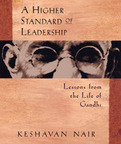2004
- The first biography of Robert Greenleaf, originator of the immensely influential concept of "servant leadership" which plays a crucial role in the writings of today's most important business thinkers and has had an major impact on organizations of all types
- Explores the origin, development, basic concepts, and practical applications of the idea of servant leadership
- Greenleaf maintained friendships with some of the most important men and women of the twentieth century, including Eleanor Roosevelt, Peter Drucker, the Menninger brothers, Reinhold Niebuhr, Aldous Huxley, Alcoholics Anonymous founder Bill Wilson, and many others
- Includes a foreword by Peter M. Senge
The Power of Servant Leadership is a collection of eight of Greenleaf's most compelling essays on servant-leadership. These essays, published together in one volume for the first time, contain many of Greenleaf's best insights into the nature and practice of servant-leadership and show his continual refinement of the servant-as-leader concept. In addition, several of the essays focus on the related issues of spirit, commitment to vision, and wholeness.
2002
Stephan Schmidheiny, author of the hugely influential Changing Course, has joined with fellow prime movers in the World Business Council for Sustainable Development-Chad Holliday of DuPont and Philip Watts of Royal Dutch/Shell-to spell out the business case for addressing sustainable development as a key business strategy.
The authors insist that a global partnership-between governments, business and civil society-is essential, if accelerating moves towards globalization are to maximize opportunities for all, especially the world's poor. They argue that far more eco-efficient and socially equitable modes of development must be pursued in order to allow poorer nations to raise their standards of living.
To achieve these aims, the book explains that markets must be mobilized in favor of sustainability, leveraging the power of innovation and global markets for the benefits of everyone. Business cannot succeed in failing societies.
Whether small, medium or large, all businesses must innovate and change to meet the social and environmental challenges of the coming years. Walking the Talk provides proven strategies for doing just that, and real-world examples of business leaders who are becoming a leading force for change-improving both their own bottom lines and quality of life for future generations around the world.
- The most important book on corporate responsibility yet published
- Written by top corporate leaders Chad Holliday, Chairman and CEO, DuPont; Stephan Schmidheiny, Chairman, Anova Holding AG; and Philip Watts Chairman of the Committee of Managing Directors, Royal Dutch/Shell Group of Companies
- A publication of the World Business Council for Sustainable Development which includes members from 160 of the largest and most influential companies from around the world including: AOL Time Warner, AT&T, Bayer, BP, Coca Cola, and Dow Chemicals (see attached list at the end of the EFS for full listing)
- Uses nearly 70 case histories of companies from around the world to show that good corporate social and environmental performance is an investment which will improve the bottom-line
- Argues that a further liberalization of the global market is the best way to alleviate third world poverty and encourage corporate responsibility
- Explores, in depth, the three pillars of sustainable development: economic growth, ecological balance, and social progress
- The authors are key insiders who show how to mobilize markets in favor of sustainable development
- Copublished with Greenleaf Publishing
o How to embody the values of service, truth, and personal responsibility in leadership roles
o Insights about management, leadership, and purpose from a successful businessman and perceptive student of Gandhi's life and writings
Though Gandhi is one of the most written-about figures of the twentieth century, this is the first book to apply lessons from his life to the practical tasks faced by contemporary leaders-from corporate managers and executives to government administrators, nonprofit professionals, educators, and others.
In times shaped by colonialism, dictatorships, and two World Wars, Gandhi demonstrated that an idealist could also be a practical and effective leader. In our times of increasing cynicism about the quality of leadership we can expect and aspire to, Keshavan Nair reminds us that, "We are all engaged in leadership, in practicing it and selecting those who will lead." In A Higher Standard of Leadership, he offers a pragmatic guide based on the concepts Gandhi exemplified:
o leadership is service, not a path to power and privilege;
o effective goals, decisions, and strategies can be guided by moral principles;
o a single standard of conduct, based on absolute values, should be maintained in both public and private life.
A lifelong student of Gandhi's teachings and a businessman with more than 25 years of experience in corporate and governmental leadership development, Nair is uniquely positioned to bridge the two worlds. Using illustrative examples from Gandhi's life and writings, he identifies commitments-to conscience, openness, service, values, and reduced attachments-and describes the courage and determination necessary to work and lead by them. In simple and direct language, he explores the process of making decisions, setting goals, and implementing actions guided by the spirit of service and commitment to values that is essential to the realization of a higher standard of leadership in our workplaces and communities.
- Shows America's economic system to be at odds with its social and political goals and proposes a system designed to increase personal freedom
- Questions the most basic assumptions that drive our economic system, and argues that its entire structure must be challenged
Imagine for a moment that you are about to take a foreign vacation to an exotic destination. You have saved your entire life to travel there. It is a destination with almost unlimited choices of how to spend your time and you know you will not have enough time to explore every opportunity. You are fairly certain that you will never get to take a second trip to this destination; this will be your one opportunity.
Now imagine that someone informs you that there are several people in your neighborhood who have been to that country, explored every corner. Some of them enjoyed the journey and have few regrets, but others wish they could take the trip again knowing what they know now. Would you not invite them over for dinner, ask them to bring their photographs, listen to their stories, and hear their advice?
This is precisely the journey explored in this book. Dr. John Izzo and his colleagues interviewed over 200 people, ages 60-106, who were identified by friends and acquaintances as “the one person they knew who had found happiness and meaning.” From town barbers to Holocaust survivors, from aboriginal chiefs to CEOs, these people had over 18,000 years of life experience between them. He asked them questions like, “What brought you the greatest joy? What do you wish you had learned sooner? What ultimately mattered and what didn't?”
Here Izzo shares their stories—funny, moving, and thought-provoking—and the Five Secrets he learned from listening to them. This book will make you laugh, bring you to tears, and inspire you to discover what matters long before you die.
2016
Five Powerful Actions to Transform Your Team, Business, and Community, 10th Anniversary Edition, Revised and Expanded
It's people who make organizations great, so how can leaders best help their people achieve that greatness? As Ken Jennings and John Stahl-Wert show in this new edition of their bestseller, you can't just demand greatness—you have to inspire it. The most effective leaders don't just stand in front of their people, they stand behind them too. As one of the characters in the book notes, “You qualify to be first by putting other people first.” This concept sounds paradoxical, but it leads to extraordinary outcomes—and The Serving Leader shows precisely how and why.
While Jennings and Stahl-Wert use a compelling fictional story to outline the basics of Serving Leadership, all the characters in it are based on real people, the organizations depicted are based on real organizations—and the results they achieved are what really happened. This edition features a new foreword by Ken Blanchard, a new introduction, and a new chapter checking back in with Mike, the main character, to see what he has learned in the twelve years since he embraced Serving Leadership
On one level this is the most practical guide available to implementing Serving Leadership; on a deeper level, it is a book about the personal journey of growth that real leadership requires. Great organizations are great because they're filled with people who freely choose to do their very best. It's a maddeningly simple concept yet stunningly hard to execute. Jennings and Stahl-Wert show leaders how to earn that kind of commitment.




















